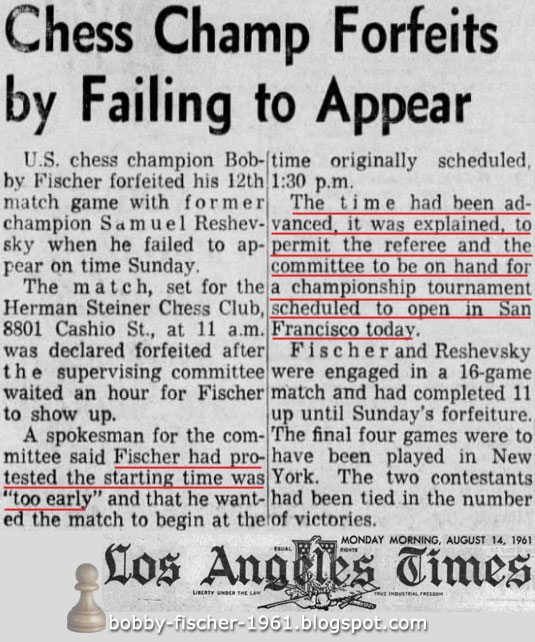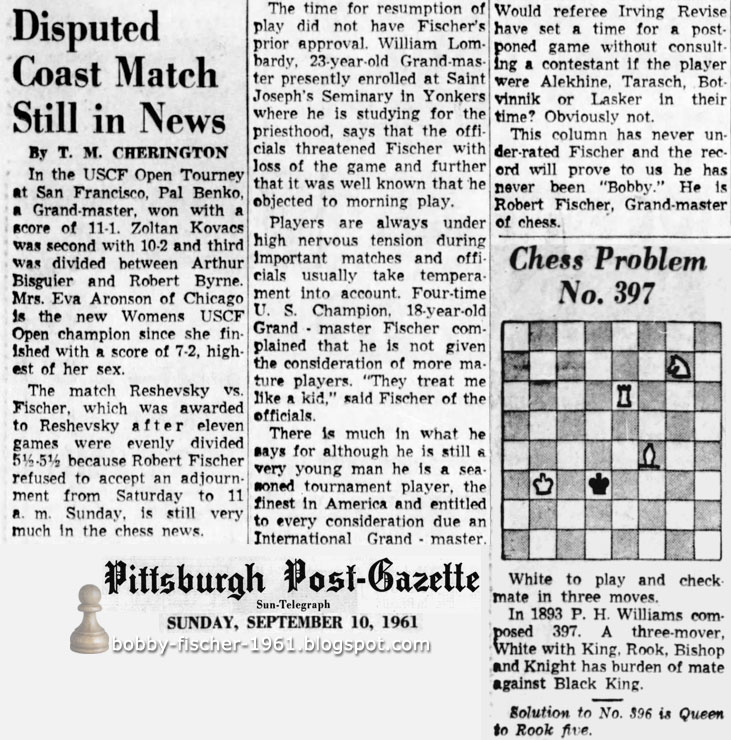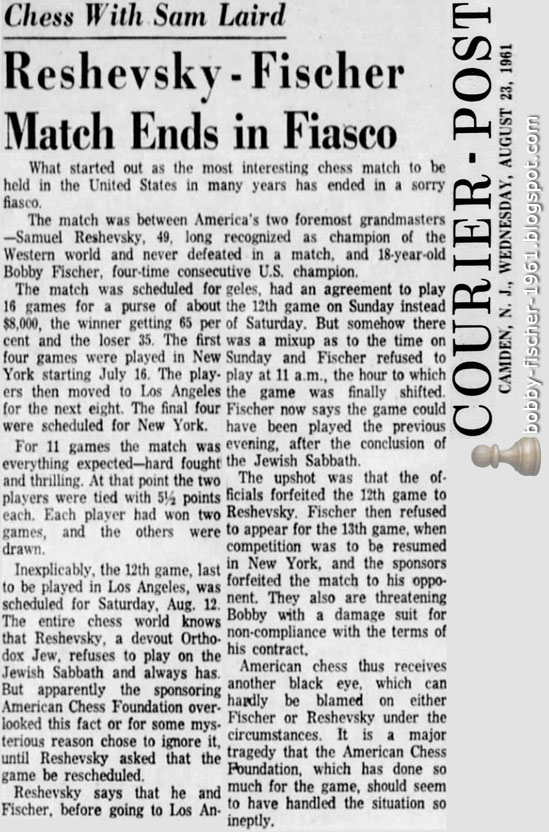Another myth busted. Newspapers and historians claim the reason the schedule was changed and that Bobby Fischer refused to show up was,
- “…that Reshevsky needed schedule changed due to sabbath…” Not true, match was already set for 1:30 pm Sunday.
- “…that Piatigorsky changed schedule due to her husband playing at a concert.” Also was fake news.
An article in Los Angeles Times confirmed the reason the match was changed to morning, and Bobby refused to play. It was ORGANIZERS making a mess of the schedule and had nothing to do with being fault of Reshevsky, Fischer or Piatigorsky… many fake stories spiraled from this event, and still being circulated.
The Los Angeles Times Los Angeles, California Monday, August 14, 1961 - Page 73, (★) “Chess Champ Forfeits by Failing to Appear”
For any with lingering doubts that the true cause of the Referee illegitimately advancing the time from Sunday, 1:30 p.m. afternoon to 11:00 a.m. morning, against Bobby Fischer's will — here's the corroborating evidence:
Oakland Tribune, Tuesday, August 15 1961 - Page 1
Pittsburgh Post-Gazette Pittsburgh, Pennsylvania Sunday, September 10, 1961 - Page 30 (★)
Courier-Post Camden, New Jersey Wednesday, August 23, 1961 - Page 4 (★)
Such a “tall tale” is found here:
Bobby Fischer (III): L'enfant terrible
Translated from E. J. Rodríguez
“A good example: the previous year an unofficial match had been organized to for the two best players in the USA to face each other. On one side was the veteran Samuel Reshevsky and the other Bobby Fischer. It was a highly publicized showdown between two former child prodigies, where a succulent prize for the winner was offered: a good amount of cash provided by Jacqueline Piatigorsky, heir to the famous Rothschild banking family. Chess fan, highborn lady with aristocratic pretensions and wife of a famous cello player, Madame Piatigorsky was the main patron of American chess. His role was so important in a country where the sport of the sixty-four squares did not receive government assistance, virtually no American player dared to contradict her, knowing how much her patronage meant for them. None … except Bobby Fischer, of course.
Both players defined their conditions to play the match. Reshevsky, who was an orthodox Jew, refused to play from Friday sunset until Saturday sunset, which was a standard clause when participating in competitions. For his part, Fischer did not like to play in the mornings, so the games would take place in the afternoon (usual schedule of the tournaments, on the other hand). The match has already began with tension running high and serious friction between the two players, such as when Fischer called Reshevsky a “coward without ethics” since he had postponed a game in an improper manner. After that, the two players refused to speak and looked at the board only; even remaining separate around the compound. Specialized chess journalist Jerry Hanken had a curious anecdote in one of the games, Fischer had a superior position and point of victory almost in his pocket. But he missed the winning move and soon realized that Reshevsky had managed to equalize the game. Forced to agree to a draw, he claims that Fischer offered it in a rather peculiar way, muttering: “You bastard!”. Whether this anecdote is true or not, it is true that this match was the beginning of a vitriolic rivalry between the two most important chess players in the United States. But something even trickier still happened: when eleven games were played and the score drew a tense tie, Mrs. Piatigorsky decreed that the next game, to commence Sunday afternoon, should be scheduled for the morning. She had to go to a concert of her husband in the afternoon, so the schedule was modified so that she could be present at both events. Reshevsky agreed immediately: the Piatigorsky were the one that put up the money and therefore the one in charge. It did not matter to him to get up early on a Sunday to play.
But Fischer became angry. He did not like to get up early, something well known in the scene. But in addition, that change of plans seemed disrespectful, and that was something he never tolerated. He argued that he had committed himself from the beginning to play in the afternoons, so that Sunday he would also play in the afternoon … or he would not play. The people around him tried to make him concede: you could not challenge Madame Piatigorsky! Many of the chess events in the country depended on her, why infuriate her? What importance if only once in his life, Bobby played in the morning, so as not to challenge the principal patrons of chess in the country? He risked Madame Piatigorsky withdrawing any future help or refusing to invite him to the tournaments she financed. But for Fischer there were no middle terms: if he thought he was right, he was right and that was it. He did not give a damn that Mrs. Piatigorsky was the great benefactor of American chess: he was not willing to get up early to satisfy the whim of a rich woman. As much as in his interviews Bobby showed a kind of fascination with the aristocracy at the time, a fascination that was certainly mutual, his strong character and pride prevented him from practicing as a “chamber chess player”. In short: since Madame Piatigorsky continued with her plan to reschedule the game to attend the concert, Fischer refused to appear. On Sunday morning, Samuel Reshevsky sat at the board … and on the other side was an empty chair. He won the point by default of the rival. Fischer also did not show up in the later games: when the second part of the match moved from Los Angeles to New York, it turned out that Bobby did not bother to get on the plane. That stubbornness so typically his would end up becoming legendary.
In response to the disappearance of the insurgent genius, Madame Piatigorsky terminated the match and considered Reshevsky the winner, who took first prize for breach of contract by Fischer. Despite the desperation of his surroundings, Bobby had not “fallen off the donkey” even if it cost him to give up a good amount of money. Money that he needed, a lot. He never changed his position on that match … and it must be said that, at the time, many chess players agreed with Bobby despite the fear that Madame Piatigorsky inspired. Fischer was not the first to break the contract. A few years later, it was Madame Piatigorsky who would tacitly acknowledge that Bobby had been right, agreeing to give him the money she owed in exchange for him playing in another of the tournaments she organized. Fischer played everything, as usual when he thought he was right, at the expense of losing money and opportunities. He did not tolerate injustice, even if that meant his own economic and social damage.”


























